Fedual Ages
专题05 阅读理解D篇(2024年新课标I卷) (专家评价+三年真题+满分策略+多维变式) 原卷版
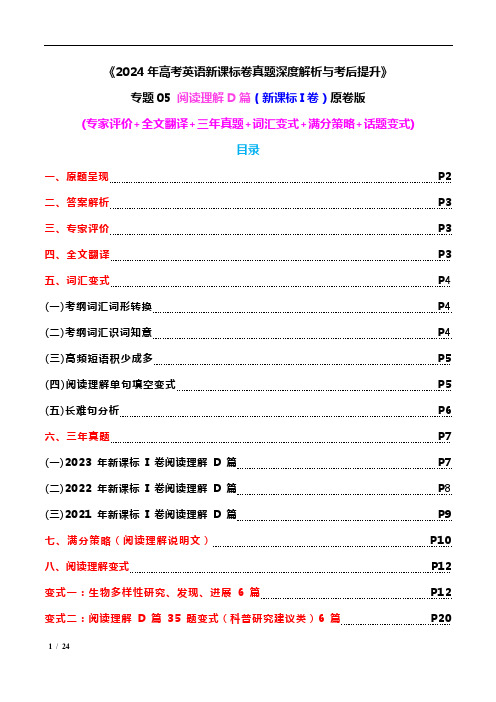
《2024年高考英语新课标卷真题深度解析与考后提升》专题05阅读理解D篇(新课标I卷)原卷版(专家评价+全文翻译+三年真题+词汇变式+满分策略+话题变式)目录一、原题呈现P2二、答案解析P3三、专家评价P3四、全文翻译P3五、词汇变式P4(一)考纲词汇词形转换P4(二)考纲词汇识词知意P4(三)高频短语积少成多P5(四)阅读理解单句填空变式P5(五)长难句分析P6六、三年真题P7(一)2023年新课标I卷阅读理解D篇P7(二)2022年新课标I卷阅读理解D篇P8(三)2021年新课标I卷阅读理解D篇P9七、满分策略(阅读理解说明文)P10八、阅读理解变式P12 变式一:生物多样性研究、发现、进展6篇P12变式二:阅读理解D篇35题变式(科普研究建议类)6篇P20一原题呈现阅读理解D篇关键词: 说明文;人与社会;社会科学研究方法研究;生物多样性; 科学探究精神;科学素养In the race to document the species on Earth before they go extinct, researchers and citizen scientists have collected billions of records. Today, most records of biodiversity are often in the form of photos, videos, and other digital records. Though they are useful for detecting shifts in the number and variety of species in an area, a new Stanford study has found that this type of record is not perfect.“With the rise of technology it is easy for people to make observation s of different species with the aid of a mobile application,” said Barnabas Daru, who is lead author of the study and assistant professor of biology in the Stanford School of Humanities and Sciences. “These observations now outnumber the primary data that comes from physical specimens(标本), and since we are increasingly using observational data to investigate how species are responding to global change, I wanted to know: Are they usable?”Using a global dataset of 1.9 billion records of plants, insects, birds, and animals, Daru and his team tested how well these data represent actual global biodiversity patterns.“We were particularly interested in exploring the aspects of sampling that tend to bias (使有偏差) data, like the greater likelihood of a citizen scientist to take a picture of a flowering plant instead of the grass right next to it,” said Daru.Their study revealed that the large number of observation-only records did not lead to better global coverage. Moreover, these data are biased and favor certain regions, time periods, and species. This makes sense because the people who get observational biodiversity data on mobile devices are often citizen scientists recording their encounters with species in areas nearby. These data are also biased toward certain species with attractive or eye-catching features.What can we do with the imperfect datasets of biodiversity?“Quite a lot,” Daru explained. “Biodiversity apps can use our study results to inform users of oversampled areas and lead them to places – and even species – that are not w ell-sampled. To improve the quality of observational data, biodiversity apps can also encourage users to have an expert confirm the identification of their uploaded image.”32. What do we know about the records of species collected now?A. They are becoming outdated.B. They are mostly in electronic form.C. They are limited in number.D. They are used for public exhibition.33. What does Daru’s study focus on?A. Threatened species.B. Physical specimens.C. Observational data.D. Mobile applications.34. What has led to the biases according to the study?A. Mistakes in data analysis.B. Poor quality of uploaded pictures.C. Improper way of sampling.D. Unreliable data collection devices.35. What is Daru’s suggestion for biodiversity apps?A. Review data from certain areas.B. Hire experts to check the records.C. Confirm the identity of the users.D. Give guidance to citizen scientists.二答案解析三专家评价考查关键能力,促进思维品质发展2024年高考英语全国卷继续加强内容和形式创新,优化试题设问角度和方式,增强试题的开放性和灵活性,引导学生进行独立思考和判断,培养逻辑思维能力、批判思维能力和创新思维能力。
2014年陕西英语高考新增词汇
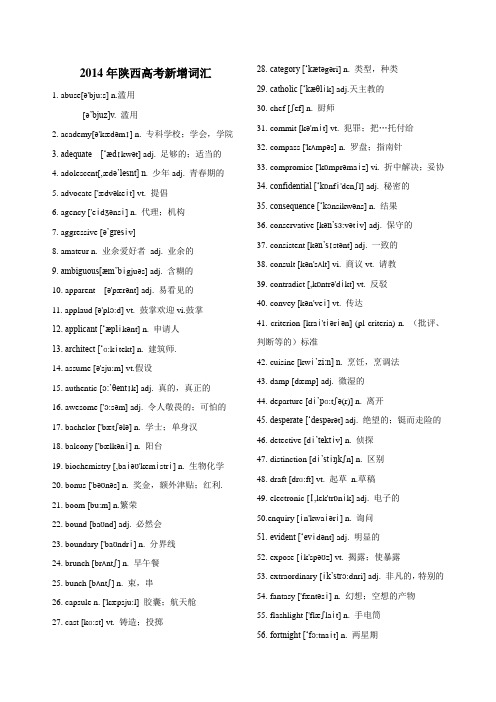
2014年陕西高考新增词汇1. abuse[ə'bju:s] n.滥用[ə’bjuz]v. 滥用2. academy[ə'kædəmɪ] n. 专科学校;学会,学院3. adequate [‘ædɪkwət] adj. 足够的;适当的4. adolescent[,ædə’lesnt] n. 少年adj. 青春期的5. advocate ['ædvəke i t] vt. 提倡6. agency ['e i dʒəns i] n. 代理;机构7. aggressive [ə’gres i v]8. amateur n. 业余爱好者adj. 业余的9. ambiguous[æm’b i gjuəs] adj. 含糊的10. apparent [ə'pærənt] adj. 易看见的11. applaud [ə'plɔ:d] vt. 鼓掌欢迎vi.鼓掌12. applicant [‘æpl i kənt] n. 申请人13. architect [‘ɑ:k i tekt] n. 建筑师.14. assume [ə'sju:m] vt.假设15. authentic [ɔ:’θentɪk] adj. 真的,真正的16. awesome ['ɔ:səm] adj. 令人敬畏的;可怕的17. bachelor ['bætʃələ] n. 学士;单身汉18. balcony ['bælkən i] n. 阳台19. biochemistry [,ba iəʊ'kem i str i] n. 生物化学20. bonus ['bəʊnəs] n. 奖金,额外津贴;红利.21. boom [bu:m] n.繁荣22. bound [baʊnd] adj. 必然会23. boundary ['baʊndr i] n. 分界线24. brunch [brʌntʃ] n. 早午餐25. bunch [bʌntʃ] n. 束,串26. capsule n. ['kæpsju:l] 胶囊;航天舱27. cast [kɑ:st] vt. 铸造;投掷28. category [‘kætəgəri] n. 类型,种类29. catholic [‘kæθl i k] adj.天主教的30. chef [ʃef] n. 厨师31. commit [kə'm i t] vt. 犯罪;把…托付给32. compass ['kʌmpəs] n. 罗盘;指南针33. compromise ['kɒmprəma i z] vi. 折中解决;妥协34. confidential [‘kɒnf i'denʃl] adj. 秘密的35. consequence [‘kɔnsikwəns] n. 结果36. conservative [kən’sɜ:vət i v] adj. 保守的37. consistent [kən’sɪstənt] adj. 一致的38. consult [kən'sʌlt] vi. 商议vt. 请教39. contradict [,kɒntrə'd i kt] vt. 反驳40. convey [kən've i] vt. 传达41. criterion [kra i't iər iən] (pl criteria) n. (批评、判断等的)标准42. cuisine [kw i’zi:n] n. 烹饪,烹调法43. damp [dæmp] adj. 微湿的44. departure [d i’pɑ:tʃə(r)] n. 离开45. desperate [‘despərət] adj. 绝望的;铤而走险的46. detective [d i’tekt i v] n. 侦探47. distinction [d i’st iŋkʃn] n. 区别48. draft [drɑ:ft] vt. 起草n.草稿49. electronic [I,lek'trɒn i k] adj. 电子的50.enquiry [i n'kwa iər i] n. 询问51. evident [‘ev i dənt] adj. 明显的52. expose [i k'spəʊz] vt. 揭露;使暴露53. extraordinary [i k’strɔ:dnri] adj. 非凡的,特别的54. fantasy ['fæntəs i] n. 幻想;空想的产物55. flashlight ['flæʃla i t] n. 手电筒56. fortnight [‘fɔ:tna i t] n. 两星期57. freeway ['fri:we i] n. 高速公路58. gallery ['ɡælər i] n. 画廊59. grand [ɡrænd] adj. 宏大的60. holy ['həʊl i] adj. 神圣的61. hydrogen [‘ha i drədʒən] n. <化>氢62. identify [a i'dent i fa i] vt. 识别63. immigration [,i m i’gre iʃn] n. 移民;移居64. librarian [la i'breər iən] n. 图书管理员65. lid [l i d] n. 盖子66. mourn [mɔ:n] vi. 哀痛vt. 表示深深的遗憾67. offensive [ə’fens i v] adj. 无礼的68. plug [plʌɡ] vt.& vi. 插上插头n. 塞子;插头69.portable [‘pɔ:təbl] adj. 手提的70. psychology [sa i'kɒlədʒi] n. 心理学71. qualification [,kwɒl i f i'ke iʃn] n. 资格72. random ['rændəm] adj. 任意的;随机的n. 随意73. receipt [r i'si:t] n. 收据74. receptionist [rɪ’sepʃən i st] n. 接待员75. reservation [,rezə've iʃn] n. 保留76. resign [r i'za i n] vt.& vi. 辞职,放弃77. sacrifice ['sækr i fa i s] n. 牺牲vt.& vi. 牺牲78. self [self]79. sideway ['sa i dwe i] n.人行道80. sleeve [sli:v] n.袖子81. spiritual [‘sp i r i tʃuəl] adj. 精神的82. stainless ['ste i nl i s] adj. 不锈的83. steep [sti:p] adj. 陡峭的84. strawberry ['strɔ:bər i] n. 草莓85. substitute ['sʌbst i tju:t] vt.& vi. 代替n. 代替者87. vacant [‘ve i kənt] adj. 空闲的V 88. valid ['væl i d] adj. 有效的89. visual ['v iʒʊəl] adj. 视觉的90. worm [wɜ:m] n. 虫,蠕虫91. factor ['fæktə(r)] n. 因素92. negative ['neɡət i v] adj. 消极的93. complain [kəm'ple i n] vi. 抱怨94. complaint [kəm’ple i nt] n. 抱怨95. detail [‘di:te i l] n. 详述96. solution [sə’lu:ʃn] n. 解决;溶解97. solve [sɒlv] vt. 解决98. involve [i n'vɒlv] vt. 包含;使参与,牵涉99. ideal [a i'di:əl] adj. 理想的n. 理想101. narrator [nə’re i tə(r)] n. (故事的)讲述者102. neutral [‘nju:trəl] adj. 中立的103. affirmative [ə’fɜ:mət i v] adj. 肯定的;赞成的104. economy [i'kɒnəm i] n. 节约;经济105. attentive [ə’tent i v] adj. 注意的。
SAT考试OG真题词汇分享
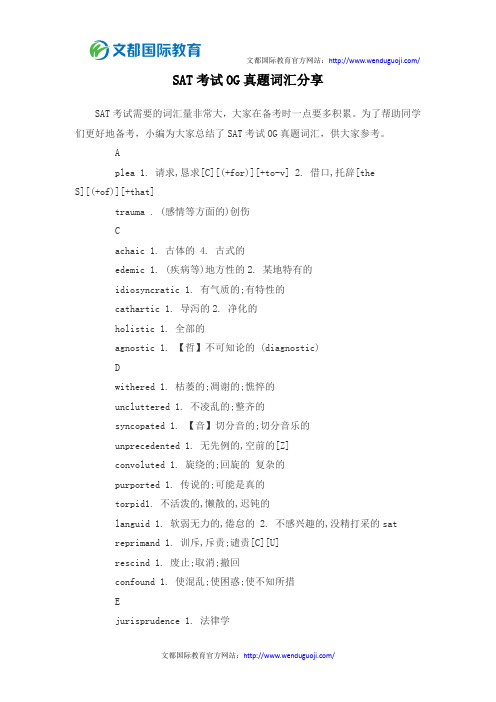
SAT考试OG真题词汇分享SAT考试需要的词汇量非常大,大家在备考时一点要多积累。
为了帮助同学们更好地备考,小编为大家总结了SAT考试OG真题词汇,供大家参考。
Aplea 1. 请求,恳求[C][(+for)][+to-v] 2. 借口,托辞[theS][(+of)][+that]trauma . (感情等方面的)创伤Cachaic 1. 古体的 4. 古式的edemic 1. (疾病等)地方性的2. 某地特有的idiosyncratic 1. 有气质的;有特性的cathartic 1. 导泻的2. 净化的holistic 1. 全部的agnostic 1. 【哲】不可知论的 (diagnostic)Dwithered 1. 枯萎的;凋谢的;憔悴的uncluttered 1. 不凌乱的;整齐的syncopated 1. 【音】切分音的;切分音乐的unprecedented 1. 无先例的,空前的[Z]convoluted 1. 旋绕的;回旋的复杂的purported 1. 传说的;可能是真的torpid1. 不活泼的,懒散的,迟钝的languid 1. 软弱无力的,倦怠的 2. 不感兴趣的,没精打采的satreprimand 1. 训斥,斥责;谴责[C][U]rescind 1. 废止;取消;撤回confound 1. 使混乱;使困惑;使不知所措Ejurisprudence 1. 法律学omniscience 1. 全知 2. (O-)上帝seclude 1. 使隔离;使孤立;使隐退,使隐居[(+from)]entourage 1. 随行人员;随员2. 周围的事物allege 1. (无充分证据而)断言,宣称[O2][+(that)] 2.提出[(+as)][+(that)]commendable 1. 值得赞美的;可钦佩的2. 可推荐的dependable 1. 可靠的;可信任的unscramble 1. 使恢复原状 2. 解读(密码)debacle 1. 灾害2. 瓦解;崩溃 3.解冻vehicle 传播媒介;工具,手段finagle 1. 欺骗 (finale)rattle 1. 使发出咯咯声 1. 咯咯声;吵闹声[S]scuttle 1. 急跑;急赶[Q][(+away/off)] 2. 逃避;逃脱 1. 天窗;气窗rebate 1. 退还;对...给回扣;对...贴现desiccate 1. 使干燥;使脱水repudiate 2. 否认,否定;驳斥,批驳consummate 1. 完美的;圆满的;绝顶的2. 熟练的,技艺高超的;高明的procrastinate 1. 延迟;耽搁intemperate 1. 不节制的;过度的2. 酗酒的3. (天气)酷烈的(寒冷的、酷热的)perforate 1. 穿孔于,打眼于perquisite 1. 额外补贴;临时津贴2. 特权harangue 1. 高谈阔论,热烈的演说[C]bereave 1. 使丧失(近亲等)[(+of)]reprieve 1. 缓刑;暂缓;暂免oppressive 1. 压迫的,压制的;不公正的;苛重的palliative 1. 缓和的;减轻的 2. 掩饰的Fmiff1. 小争执;微怒scoff 1. 嘲笑,嘲弄 1. 贪婪地吃[(+up)]2. 抢劫;偷窃Gscintillating 1. 闪烁的unwitting 1. 不知情的2. 不知不觉的;无意的unnerving 1. 使人胆怯的;使人紧张不安的smug 1. 沾沾自喜的,自鸣得意的 Hsuelch 1. 压扁 3. 镇压;粉碎dispatch 1. 派遣;发送;快递[(+to)] 2. 迅速处理,迅速了结;匆匆吃完rehash 1. 重新处理;改写;重讲priggish 1. 一本正经的;傲慢的;矫饰的;自以为了不起的satfamish 1. 使挨饿[H]garish 1. 炫耀的;过分装饰的 2. 过分鲜艳的,耀眼的Kslick 1. 光滑的;滑溜溜的2. 熟练的;灵巧的flock 1. 羊群;(飞禽,牲畜等的)群1. 聚集;成群地去(或来)[Q]shirk 1. 逃避义务(或责任等),偷懒Lferal 1. 野生的aural 1. 耳的;听觉的;听到的 2. 气味的;香味的 3. 预感的,先兆的4. 【电】电风的,辉光的filial 1. 子女的;孝顺的gubernatorial 1. 【美】州长的quintessential 1. 精髓的;典型的temperamental1. 气质的,性情的;性格的[Z] 2. 易兴奋的;易怒的counsel 1. 商议,审议[U] 2. 忠告,劝告[U]hail 3. 招呼quell 1. 镇压;平息;压制pill 3. 无法避免的讨厌事,屈辱事[C][S1]overhaul 1. 拆开检修,大修tactful 1. 机智的;圆滑的;老练的;乖巧的Mmodicum 1. 少量consortium 1. 合伙;联合 2. 国际财团;国际借款团hokum 1. 噱头,逗笑之手法 2. 空话,胡扯humdrum 1. 平凡的 2. 单调的;无聊的tantrum 1. 发脾气;发怒Ninvocation 1. 祈愿renunciation 1. (权利等的)宣告放弃;抛弃[C][U][(+of)]indignation 1. 愤怒;愤慨,义愤[U][(+about/at/over)]recrimination 1. 反责;反控predilection 1. 嗜好;偏爱insurrection 1. 起义;暴动;造反;叛乱[C][U]benediction 1. 祝福;祝愿sermon 1. 布道,说教 2. (令人生厌的)冗长讲话 3. 训斥 4. (自然物给人的)启示venison 1. 鹿肉mutton 羊肉Oobject to 1. 对...反对 (subject to)manifesto 1. 宣言;告示Pcusp . 尖,尖顶, 尖端, 尖突以上就是小编为大家总结的SAT考试OG真题词汇,希望可以给同学们带来帮助。
英语词根词缀大全
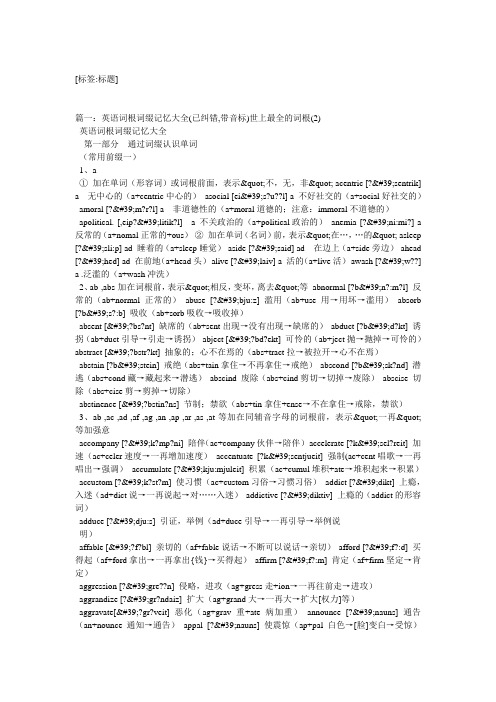
[标签:标题]篇一:英语词根词缀记忆大全(已纠错,带音标)世上最全的词根(2)英语词根词缀记忆大全第一部分通过词缀认识单词(常用前缀一)1、a-①加在单词(形容词)或词根前面,表示"不,无,非" acentric [?'sentrik]a 无中心的(a+centric中心的)asocial [ei's?u??l] a 不好社交的(a+social好社交的)amoral [?'m?r?l] a 非道德性的(a+moral道德的;注意:immoral不道德的)apolitical. [,eip?'litik?l] a 不关政治的(a+political政治的)anemia [?'ni:mi?] a 反常的(a+nomal正常的+ous)②加在单词(名词)前,表示"在…,…的" asleep [?'sli:p] ad 睡着的(a+sleep睡觉)aside [?'said] ad 在边上(a+side旁边)ahead [?'hed] ad 在前地(a+head头)alive [?'laiv] a 活的(a+live活)awash [?'w??]a .泛滥的(a+wash冲洗)2、ab-,abs-加在词根前,表示"相反,变坏,离去"等abnormal [?b'n?:m?l] 反常的(ab+normal正常的)abuse [?'bju:z] 滥用(ab+use用→用坏→滥用)absorb [?b's?:b] 吸收(ab+sorb吸收→吸收掉)absent ['?bs?nt] 缺席的(ab+sent出现→没有出现→缺席的)abduct [?b'd?kt] 诱拐(ab+duct引导→引走→诱拐)abject ['?bd?ekt] 可怜的(ab+ject抛→抛掉→可怜的)abstract ['?bstr?kt] 抽象的;心不在焉的(abs+tract拉→被拉开→心不在焉)abstain [?b'stein] 戒绝(abs+tain拿住→不再拿住→戒绝)abscond [?b'sk?nd] 潜逃(abs+cond藏→藏起来→潜逃)abscind 废除(abs+cind剪切→切掉→废除)abscise 切除(abs+cise剪→剪掉→切除)abstinence ['?bstin?ns] 节制;禁欲(abs+tin拿住+ense→不在拿住→戒除,禁欲)3、ab-,ac-,ad-,af-,ag-,an-,ap-,ar-,as-,at-等加在同辅音字母的词根前,表示"一再"等加强意accompany [?'k?mp?ni] 陪伴(ac+company伙伴→陪伴)accelerate [?k'sel?reit] 加速(ac+celer速度→一再增加速度)accentuate [?k'sentjueit] 强制(ac+cent唱歌→一再唱出→强调)accumulate [?'kju:mjuleit] 积累(ac+cumul堆积+ate→堆积起来→积累)accustom [?'k?st?m] 使习惯(ac+custom习俗→习惯习俗)addict [?'dikt] 上瘾,入迷(ad+dict说→一再说起→对……入迷)addictive [?'diktiv] 上瘾的(addict的形容词)adduce [?'dju:s] 引证,举例(ad+duce引导→一再引导→举例说明)affable ['?f?bl] 亲切的(af+fable说话→不断可以说话→亲切)afford [?'f?:d] 买得起(af+ford拿出→一再拿出{钱}→买得起)affirm [?'f?:m] 肯定(af+firm坚定→肯定)aggression [?'gre??n] 侵略,进攻(ag+gress走+ion→一再往前走→进攻)aggrandize [?'gr?ndaiz] 扩大(ag+grand大→一再大→扩大[权力]等)aggravate['?gr?veit] 恶化(ag+grav重+ate病加重)announce [?'nauns] 通告(an+nounce通知→通告)appal [?'nauns] 使震惊(ap+pal白色→[脸]变白→受惊)applause [?'pl?:z] 鼓掌(ap+pease赞扬→一再赞扬→鼓掌)appreciate [?'pri:?ieit] 欣赏(ap+reci价值+ate→一再给价→欣赏)appoint[?'p?int] 指定,任命(ap+point 指→指定)arrange[?'reind?] 安排(ar+range排列→安排)arrest [?'rest] 逮捕,阻止(ar+rest休息→不让动→逮捕)arrive [?'raiv] 到达(ar+rive河→到达河边→达到目标)assault [?'s?:lt] 进攻(as+saul跳→跳起来→进攻)assiduous [?'sidju?s] 勤奋的(as+sid坐+uous→一再坐着[学习] →勤奋)assist [?'sist] 帮助(as+sist站→站过来→帮助)associate [?'s?u?ieit] 联合,结合(as+soci社团+ate→结成团队→联合)assimilate[?'simileit] 吸收;同化(as+simil相同+ate→成为相同→同化)assure [?'?u?] 肯定;确信(as+sure确定→一不再确定→肯定)attach [?'t?t?] 附上;依恋(at+tach接触→接触上→附上)attain[?'tein] 达到;获得(at+tain拿住→获得)attend[?'tend] 参加(at+tend关心→关心到了→出度)attract[?'tr?kt] 吸引(拉→拉过来→吸引)attest[?'test] 证实(at+test试验→一再试验→证实)4、ad-加在在单词或词根前,表示"做…,加强…" adapt [?'d?pt] 适应(ad+apt能力→有适应能力)adept ['?dept, ?'dept] 熟练的(ad+ept能力→有做事能力→熟练的)adopt [?'d?pt] 收养;采纳(ad+opt选择→选出来→采纳)adhere [?d'hi?] 坚持(ad+here粘→粘在一起→坚持)adjacent[?'d?eis?nt] 邻近的(ad+jacent躺→躺在一起→邻近的)adjoin [?'d??in]贴近;毗连(ad+join参加→参加在一起→贴近)administrate [?d'ministreit] 管理;执行(ad+ministr部长+ate→做部长→管理)admire [?d'mai?] 羡慕(ad+mire惊奇→惊喜;羡慕)adumbrate ['?d?m,breit] 预示(ad+umbr影子+ate→[将来的]影子出现→预示)adjust ?'d??st] 调整(ad+just+正确→弄正确→调整)adventure [?d'vent??] 冒险(ad+venture冒险)admonish[?d'm?ni?] 告诫,警告(ad+mon警告+ish→一再警告)advent ['?dv?nt] 来临,来到(ad+vent来→来到)5、amphi-表示"两个,两种"amphibian [?m'fibi?n] 两栖动物(amphi+bi生命+an→两个生命→两栖动物)amphicar ['?mfi,kɑ:] 水陆两用车(amphi+car车→两用车)6、an-在词根前,表示"不,无"anarchism ['?n?kiz?m] 无政府主义(an+arch统治+ism→无统治→无政府主义)anharmonic [?nhɑ:m?nik] 不和谐的(an+hamonic和谐的→不和谐的)anechoic [,?ne'k?uik] 无回声的(an+echo回声+ic→无回声的)anonymous[?'n?nim?s] 匿名的(an+onym名字+ous→匿名的)7、ana-表示"错误,在旁边,分开"analogy[?'n?l?d?i] 类比;类似(ana+logy讲话→再旁边讲→讲一样的东西→类似) analogous[?'n?l?g?s] 类似的(analogy的形容词)analysis [?'n?l?sis] 分析(ana+lysis分开→分开来→分析)8、ante-表示"前面,先"antedate['?nti'deit] 提前写日期;先于,早于(ante+date日期→提前写日期)anterior[?n'ti?ri?] 前面的(ante+erior[…的] →前面的)antecedent [,?nt?'si:d?nt]前情,先行词(aute+ced走+ent→走在前面的[事] →前事)9、anti-表示"反对,相反"antiwar [,?ntai'w?:] 反战的(anti+war战争)antipathy [?n'tip?θi] 反感(anti+pathy 感情)antithesis [?n'tiθisis] 对立;反论(anti+thesis论文;观点)antibacterial [,?ntib?k'ti?ri?l] 抗菌的(anti+bacterial细菌的)antibody ['?nti,b?di] 抗体(anti+body身体)10、人,人类-anthrop(o)anthropology[?nθr?'p?l?d?i] [anthropo 人类,-logy…学者]人类学anthropologist[?nθr?'p?l?d?ist] [anthropo 人类,-logist…学者]人类学者anthropogeography[,?nθr?p?ud?i'?ɡr?fi] [anthropo 人类,gegoraphy地理学]人类地理学anthropomorphous [?nθr?p?'m?:f?s] [anthropo 人,morph形,-ous…的]有人形的,似人的anthroposociology[,?nθr?p?ud?i'?ɡr?fi] [anthropo 人类,sociology社会学]人类社会学11、人民―(1)populpopulation [,p?pju'lei??n][popul 人民→居民,-ation名词字尾]全体居民,人口populous['p?pjul?s] [popul 人民→居民,-ous…的]人口稠密的populate[p?pj?leit] [popul 人民,-ate动词字尾,使…,做…]使人民居住于…中,使人口集中在…之中,移民于…. repopulate [ri:'p?pj?leit] [re-再,重新,见上]使人民重新居住于…depopulate [di:'p?pjuleit] [de-除去,去掉,popul人民→人口,-ate使…]使(某地)人口减少,减少人口popularity [,p?pju'l?riti] [见上,-ity名词字尾,表示性质]大众性,通俗性popularize ['p?pjul?raiz][见上,- ize…化,使…](使)大众化,(使)普及,推广popularizer ['p?pj?l?raiz?(r)] [见上,-er者]普及者,推广者popularization [,p?pjul?rai'zei?n] [见上,-ation表示行为]普及,推广,通俗化populace ['p?pjul?s] [popul 人民→平民,-ace名词字尾]平民,大众人民-(2)dem(o)democracy [di'm?kr?si] [demo 人民,cracy统治;"人民统治"→人民做主→]民主;民主政治,民主政体;民主主义democrat ['dem?kr?t] [见上,crat主张…统治的人]民主主义者democratism [di'm?kr?tizm] [见上,-ism主义]民主主义democratize [di'm?kr?taiz] [见上,-ize…化]民主化;使民主化democratic [,dem?'kr?tik] [见上,-ic…的]民主的,民主主义的;民主政体的demography [di:'m?ɡr?fi] [demo人民→人数,人口,graphy写,记录→统计]人口统计学demographic [dem?'ɡr?f?k] [见上,-ic…的]人口统计的epidemic [,epi'demik] [epi-在…之间,dem人民,-ic…的;"流行于人民之中的" →]流行的,传染的;流行病,时疫epidemiology [,epi,di:mi'?l?d?i] [见上,- io-连接字母,-logy…学]流行病学epidemiologist ['epi,di:mi'?l?d?ist] [见上,-logist…学者]流行病学者epidemiological [epidi:mi?'l?d?ik?l] [见上,-logical…学的]流行病学的男-(1)andr(o)androgyne ['?ndr?d?ain] [andro男人,gyn女人]具有男妇两性的人,阴阳人androgynism [andro男,gyn女,-ism表性质状态]半男半女男-(2)virvirile ['virail] [vir男,ile形容词字尾,…的]男的,男性的,男子的,有男子气概的,有男性生殖力的virilism ['viriliz?m] [见上,-ism表示现象]男性现象virility [vi'riliti] [见上,-ity表示性质]男子气概,男生殖力,男子的成年女-(1)gyn(o);gynec(o)gynecology [gain?'k?l?d?i] [gyneco妇女,-logy…学]妇科学,妇科gynecologist [gain?'k?l?d?ist] [见上,-ist人]妇科医生*gynecian [gynec妇女,-ian…的]妇女的,妇人的女-(2)fem;feminfemale ['fi:meil] [fem女,妇女]女性的,妇女的;女子feminine ['feminin] [femin 女,-ine…的]女性的,妇女的feminality [femi'n?liti] [femin女,-ality表示性质]女性,妇女的特性femininity [femi'niniti] [feminine(e)女性的,-ity表示性质]女子的气质,女人气,妇女总称feminism ['feminizm] [femin女,-ism主义]男女平等主义;[-ism表示行为]争取女权运动femme [fem] 妇女;妻子12、be-①构成动词,表示"使…成为"beguile [bi'ɡail] 欺骗(be+guile欺骗)belie [bi'lai] 掩盖(be+lie说慌)bequeath [bi'kwi:e] 遗留给,传下(be+queath要求→要求给某人→遗留给)besiege [bi'si:d?] 围攻(be+siege包围→包围起来) beware [bi'w??] 注意(be+ware 注意)befriend [bi'frend]友好对待(be+friend朋友)befool[bi'fu:l] 欺骗(be+fool笨蛋→使人成笨蛋→欺骗别人)befall [bi'f?:l] 降临;发生(be+fall掉下→掉下来→发生)belittle[bi'litl] 小看(be+little小→小看人) bewilder [bi'wild?] 使…迷惑(be+wilder迷惑)②构成一些介词before [bi'f?:]在前面(be+fore前面)beneath [bi'ni:θ]在下面(be+neath下面)13、bene- 表示"善,好"benevolent [bi'nev?l?nt] 好意的(bene+vol意愿+ent→好意的)benefaction [beni'f?k??n] 好事;恩惠(bene+fact做+ion→好事)benefit ['benifit] 好处,利益(bene+fit做→做事后的好处→利益)benediction [beni'dik∫?n] 祝福(bene+dict说+ion →说好话)beneficent仁慈的,善行的(bene+fic做+ent→做好事的)14、bi-表示"两个,两"biweekly ['bai'wi:kli] 双周刊(bi+week星期+ly→两星期)bilingual [bai'li?ɡw?l] 双语种的(bi+lingu语言+al→双语的)biennial [bai'eni?l] 两年一次的(bi+enn 年+ial→两年〔一次〕的)biannual [bai'?nju?l]一年两次的(bi+ann[年]+ual→一年两次的)15、by-表示"在旁边,副的"byproduct ['baipr?d?kt] 副产品(by+product产品)byroad 辅路(by+road路)byway ['bai,wei] 小道(by+way小路)bygone ['bai,g?:n] 过时的(by+gone过去的)bypass ['bai,pɑ:s] 旁路;忽略(by+pass通过→从旁边通过→忽略)bywork 副业(by+work工作)16、circum-表示"环绕,周围"circumcise ['s?:k?msaiz] 环割(circum+cise切→环切)circumference [s?'k?mf?r?ns] 周长(circum+fer带来→ence→带来一圈→周长)circumnavigate [?s?:k?m'n?viɡeit] 环航世界(circum+navigate航行)circumscribe ['s?:k?mskraib,,s?:k?m'skraib]限制(circum+scribe写→规定范围→限制)circumspect ['s?:k?mspekt] 小心谨慎的(circum+stance站→站在周围→环境)circumvent [?s?:k?m'vent] 回避(circum+vent走→绕圈走→回避)17、co-表示"共同",通常放在元音词根前cooperation [k?u,?p?'rei??n] 合作(co+operation操作→共同操作→合作)coagulate[k?u'?ɡjuleit] 凝结(co+agul凝聚+ate→凝聚起来) coalesce [,k?u?'les] 联合;合作(co+al=ally联盟+esce) coexist [k?uig'zist] 共存(co+exist存在)cohere [k?u'hi?] 附着;粘着(co+here粘→粘在一起)coincide [,k?uin'said] 一致;符合,巧合(co+in进+cide掉下→共同掉进来→巧合) coordinate [k?u'?:dinit] 协调:同等的(co+ordin顺序+ate→顺序一样→同等的引申为平等;协调)18、col-,cor在同辅音词根前,表示"共同"collaboration [k??l?b?'rei∫?n] 协作;合著(col+labor劳动+ation→共同劳动) collocate ['k?l?keit] 并置,排列(col+loc地方+ate→放在同一地方→排列)collingual 用同一种语言的(col+lingu语言+al→同语言的) collapse [k?'l?ps] 倒塌(col+lapse滑倒→全部滑倒→倒塌) collate [k?'leit] 校对(col+late放→放到一起→校对) collateral [k?'l?t?r?l] 并列的,并行的(col+later边→al→周边的→并列的)colleague ['k?li:g] 同事(col+→league捆绑→捆绑在一起的人→同事)collect [k?'lekt] 收集(col+lect选择→放在一起选择→收集) collegiate [k?'li:d?iit]学院的;学生的(col+legi读+ate→共同读书→学院的)colloquial [k?'l?ukwi?l] 口语的(col+loqu说+ial→两人一起说→口语会话的)collusion [k?'l(j)u:??n] 共谋,勾结(col+lus玩+ion→共同玩弄→共谋)correct [k?'rekt] 改正,纠正(cor+rect正→全部改正→纠正) correspond [k?ris'p?nd] 通信;符合(cor+respond反应→共同反应→相互通信)corrupt [k?'r?pt] 腐败的;变环的(cor+rupt断→全部断→变坏的,腐败的)corrigible ['k?rid??bl] 能够改正的(cor+rig改正+ible→全部改正的) corroborate [k?'r?b?reit] 证实(cor+robor力量+ate→用力量→证实)19、com-,con-表示"共同"combine [k?m'bain] 联合,结合(com+bine捆→捆在一起→结合) compassion [k?m'p???n] 同情(com+passion爱国者→同胞) compatriot [k?m'p?tri?t] 同胞(com+patriot动→大家一起动→动乱)commend [k?'mend] 赞扬;推荐(com+mend信任;命令→大家信任→赞扬;参考;recommend)commemorate [k?'mem?reit] 纪念(com+memor记住+ate→大家一起记住→纪念) commensurable [k?'men∫?r?bl]相等的,相称的(com+mensur测量+able→能放在一起的测量→相等的)comparison [k?m'p?risn] 比较(com+pari平等+son→一起平等→比较)compact ['k?mp?kt] 紧密的;合同(com+pact压紧→全部压紧→紧密的)comfort ['k?mf?t] 安慰(com+fort加强→[精神]强大→安慰) commodious [k?'m?udi?s] 宽敞的(com+mod动+ious→共同动→有动的地方→宽敞的)compete [k?m'pi:t] 比赛(com+pete追求→一起追→比赛) component [k?m'p?un?nt] 成分(com+pon放+ent→放到一起[的东西]→成分)compress [k?m'pres] 压缩(com+press压→一起压→压缩) concentric [k?n'sentrik] 同中心的(con+centric中心的)contemporary [k?n'temp?r?ri] 同时代的(con+tempor时间+ary→同时间的)conclude [k?n'klu:d]结束;总结(con+clude关闭→全部关闭→结束) confirm [k?n'f?:m] 坚定;证实(con+firm坚定) condense [k?n'dens] 凝结;浓缩(con+dense浓密的)consolidate [k?n's?lideit] 巩固,加强(con+solid坚固+ate→成为大家的财产→没收) conflict ['k?nflikt] 冲突(con+flict打→一起打斗→冲突)confluence ['k?nflu?ns] 汇流(con+flu流+ence→共同流→汇流)congregate ['k??ɡriɡeit] 集合的,聚集的(con+greg集合+ate→集合到一起→聚集的)console [k?n's?ul] 安慰(con+sole安慰→一起安慰)20.contra-表示"反对,相反"contrary ['k?ntr?ri] 相反的(contra+ary→相反的)contradict [k?ntr?'dikt] 反驳;矛盾(contra+dict说→反着说→反驳)contravene [,k?ntr?'vi:n] 违反,违背(contra+vene走→反着走→违反)contraband ['k?ntr?,b?nd] 走私(contra+band命令→违反命令做事→走私;参考:ban 禁止)21.counter-表示"反对,相反"counteract [,kaunt?'r?kt] 对抗;抵消(counter+act行为→反着行动→对抗)counterbalance [,kaunt?'b?l?ns] 平衡(counter+balance平衡→两边一样→达到平衡)countermand [,kaunt?'mɑ:nd] 撤消(counter+mand命令→反命令→撤消〔命令〕)22.de- ①表示"去掉,变坏,离开,变慢,向下"等destruction [dis'tr?k??n] 破坏(de+struct结构;建造+ion→弄坏结构→破坏)desalt [di:'s?:lt] 除去盐分(de+salt盐→去掉盐分)deforest [di'f?rist] 砍伐森林(de+forest森林→去掉森林)devalue [di:'v?lju:] 降低价值(de+value价值→去掉价值)depress [di'pres] 压制,压抑(de+press压→向下压→压制)detrain [di:'trein] 下火车(de+train火车)decelerate [di:'sel?reit] 减速(de+celer速度+ate→使速度变慢)decode [,di:'k?ud] 破译(de+code密码→去掉密码)defame [di'feim] 诽谤,中伤(de+fame名声→名声变坏→诽谤)②表示"使…成为,加强"等delimit [di:'limit] 划定界限(de+limit限定→加强限定)depict [di'pikt] 描绘(de+pict图画→成为图画→描绘)design [di'zain] 设计;计划(de+sign做标志→设计)definition [,defi'ni??n] 定义;清晰(de+fin界限+ition→划出界限→定义)23.di- ①表示"两个,双"dichromatic [?daikr?'m?tik] 两色的(di+chrom颜色+atic→两色的)dioxide [dai'?ksaid] 二氧化物(di+ox氧+ide→二氧化物)dilemma [di'lem?, dai-] 进退两难(di+lemma争论→二种争论→进退两难)dichotomize [di'k?t?maiz] 分成二,对分(dicho=di+tom切割+ize→切成二分)②表示"使…变成,分开,离开"dilate [dai'leit] 膨胀,扩大(di+late放→分开放→扩大)dilute [dai'lju:t?di'l-] 冲淡,稀释(di+lute冲洗→冲洗开→冲淡) digest di'd?est; dai'd?est]消化;文摘(di+gest带→带下去→消化→经过消化后的精华→文摘)diminish [di'mini?] 减少;消失(di+mini小+ish→变小,减少)digress [dai'gres] 离题(di+gress走→走开→离题)divide [di'vaid] 分开(di+vide分开→分开)divorce [di'v?:s] 离婚(di+vorce=vert转→从〔丈夫身边〕转开→离婚;参考:divert 转开)父,祖-patr(i);part(o);paterpatriarch ['peitrɑ:k] [patri父,祖arch首脑,长]家长;族长patriarchal [?peitri'ɑ:k?l] [见上,-al…的]家长的;族长的;家长似的patriot ['peitri?t,'p?t-] [patri 祖→祖国,-ot名词字尾,表示人]爱祖国者,爱国主义者patriotic [?p?tri'?tik,?peitri-]〔见上,-otic形容词字尾,…的〕爱国的patriotism ['p?tri?tiz?m,'pei-] [见上,-ism主义]爱国主义;爱国心unpatriotic ['?np?tri'?tik] 〔un-不,见上〕不爱国的paternal 〔pater父,-n-,-al…的〕父亲的,父系的paternalism [ p?'tз:n?l?z?m] [见上,-ism表示行为,现象]家长式统治,家长作风母-matr(i);mater; metromatriarch ['meitriɑ:k] [ matri母→女性,arch首脑,长]女族长;女家长matrimony ['m?trim?ni] [matri母→婚姻,-mony名词字尾]婚姻,结婚matrimonial [?m?tri'm?unj?l,-ni?l〔见上,-al…的〕婚姻的,结婚的matron 〔mart母,-on表示人〕主妇,老妇matronage [`me?tr?n?d?] [见上,-age名词字尾]主妇的身份或职责maternal [m?'t?:nl] [matr母,-n-,-al…的]母亲的,母性的maternity [m?'t?:niti] [见上,-ity名词字尾]母性的,母性的metropolis [m?'tr?p?l?s] [metro母,polis城市;"母城" →首城,最大的城]大城市,主要城市,大都会,首府24.dia-表示"穿过,二者之间"dialogue ['dai?l?g] 对话(dia+logue话→对着说话)diameter [dai'?mit?] 直径(dia+meter测量→对着测量〔圆〕直径)diaphanous [dai'?f?n?s] 透明的;精致的(dia+phan显示+ous→对面显示〔影子〕→透明的)dialectic [?dai?'lektik] 辩证法(dia+lect讲+ic→二人对讲→辩证法)diagnosis [,dai?g'n?usis] 诊断(dia+gnosis知道→穿过〔皮肤〕知道→诊断)diagram ['dai?gr?m] 图表(dia+gram→交叉对着画→图表)25.dif-和辅音重复表示"不,否定,分开"differ [ 'dif? ] 不同(dif+fer带来→带来不同→不同)difference ['dif?r?ns] 不同(differ的名词)diffident ['difid?nt] 自卑的(dif+fid相信+ent→不相信〔自己〕→自卑的)diffuse [di'fju:z] 散布的,散开的(dif+fuse流→分开流→散布的)difficult ['difik?lt] 困难的(dif+fic做+ult→不好做→困难的)difform [di'f?:m] 不同形式的;不规则的(dif+form形状→形状不同)26.dis-①表示"不,消失掉"dislike [dis'laik] 不喜欢(dis+like喜爱→不喜爱)disorder [dis'?:d?] 无秩序(dis+order顺序→没有顺序)dishonest [dis'?nist] 不诚实的(dis+honest诚实的)disappear [,dis?'pi?] 消失(dis+appear出现→不出现→消失)disproof ['dispru:f] 反证,反驳(dis+proof证实→不证实→反证)discourage [dis'k?rid?] 使失去勇气(dis+courage勇气)disarm [dis'ɑ:m, diz-] 解除武装(dis+arm武装→去掉武装)dispel [dis'pel] 驱除,消除(dis+pel推→推开→驱除)dispassionate[dis'p???nit]平心静气的(dis+passionate有激情的)discover [dis'k?v?] 发现(dis+cover盖→把盖揭开→发现)dismay [dis'mei] 沮丧(dis+may能够→不能做事→沮丧;参考:五月能种粮食,所以叫May)②表示"分开,分离" disseminate [di'semineit] 散布,传播(dis+semin种子+ate→散布〔种子〕)dispense [dis'pens] 分配(dis+pense花费→分开花费→分配〔财富等〕)distract [dis'tr?kt] 分心(dis+tract拉→把〔心〕拉开→分心)distend [dis'tend] 膨胀(dis+tend拉→分开拉→膨胀)discriminate [dis'krimineit]辨别;歧视(dis+crimin 分辨→ate→分辩开)dismiss [dis'mis] 解散;开除(dis+miss送→送出→解散)disburse [dis'b?:s] 支付,支出(dis+burse钱包→从钱包中分出→支出)discard [dis'kɑ:d] 丢弃,抛弃(dis+card扔→扔出去)discuss [dis'k?s] 讨论(dis+cuss敲打→把〔问题〕分开敲→讨论)27.dys-表示"坏,不良"dyspepsia [dis'pepsi?] 消化不良(dys+peps消化;胃+ia病→消化不好)dystrophy ['distr?fi] 营养不良(dys+trophy营养)篇二:英语词根词缀记忆大全(整理打印版)arrest 逮捕,阻止(ar+rest 休息→不让动→逮捕)arrive 到达(ar+rive 河→到达河边→达到目标)assault 进攻(as+saul 跳→跳起来→进攻)第一部分通过词缀认识单词assiduous 勤奋的(as+sid 坐+uous→一再坐着[学习] →勤奋)(常用前缀一)assist 帮助(as+sist 站→站过来→帮助)1、a- associate 联合,结合(as+soci 社团+ate→结成团队→联合)①加在单词或词根前面,表示"不,无,非" assimilate 吸收;同化(as+simil 相同+ate→成为相同→同化)acentric 无中心的(a+centric 中心的)assure 肯定;确信(as+sure 确定→一不再确定→肯定)asocial 不好社交的(a+social 好社交的)attach 附上;依恋(at+tach 接角→接触上→附上)amoral 非道德性的(a+moral 道德的;注意:immoral 不道德attain 达到;获得(at+tain 拿住→获得)attend的)(at+tend 关心→关心到了→出度)apolitical. 不关政治的(a+political 政治的)attract 吸引(拉→拉过来→吸引)anemia 反常的(a+nomal 正常的+ous)attest 证实(at+test 试验→一再试验→证实)②加在单词前,表示"在?,?的" 4、ad-加在在单词或词根前,表示"做?,加强?" asleep 睡着的(a+sleep 睡觉)adapt 适应(ad+apt 能力→有适应能力)aside 在边上(a+side 旁边)adept 熟练的(ad+ept 能力→有做事能力→熟练的)ahead 在前地(a+head 头)adopt 收养;采纳(ad+opt 选择→选出来→采纳)alive 活的(a+live 活)adhere 坚持(ad+here 粘→粘在一起→坚持)awash .泛滥的(a+wash 冲洗)adjacent 邻近的(ad+jacent 躺→躺在一起→邻近的)adjoin 2、ab-,abs-加在词根前,表示"相反,变坏,离去"等贴近;毗连(ad+join 参加→参加在一起→贴近)abnormal 反常的(ab+normal 正常的)administrate 管理;执行(ad+ministr 部长+ate→做部长→管abuse 滥用(ab+use 用→用坏→滥用)理)absorb 吸收(ab+sorb 吸收→吸收掉)admire 羡慕(ad+mire 惊奇→惊喜;羡慕)absent 缺席的(ab+sent 出现→没有出现→缺席的)adumbrate 预示(ad+umbr 影子+ate→[将来的]影子出现→预示)abduct 诱拐(ab+duct 引导→引走→诱拐)adjust 调整(ad+just+正确→弄正确→调整)abject 可怜的(ab+ject 抛→抛掉→可怜的)adventure 冒险(ad+venture 冒险)abstract 抽象的;心不在焉的(abs+tract 拉→被拉开→心不admonish 告诫,警告(ad+mon 警告+ish→一再警告)在焉)advent 来临,来到(ad+vent 来→来到)abstain 戒绝(abs+tain 拿住→不再拿住→戒绝)5、amphi-表示"两个,两种" abscond 潜逃(abs+cond 藏→藏起来→潜逃)amphibian 两栖动物(amphi+bi 生命+an→两个生命→两栖动物)abscind 废除(abs+cind 剪切→切掉→废除)amphicar 水陆两用车(amphi+car 车→两用车)abscise 切除(abs+cise 剪→剪掉→切除)6、an-在词根前,表示"不,无" abstinence 节制;禁欲(abs+tin 拿住+ense→不在拿住→戒除,anarchism 无政府主义(an+arch 统治+ism→无统治→无政府主禁欲)义)3、ab-,ac-,ad-,af-,ag-,an-,ap-,ar-,as-,at-等加在同辅音anharmonic 不和谐的(an+hamonic 和谐的→不和谐的)字母的词根前,表示"一再"等加强意anechoic 无回声的(an+echo 回声+ic→无回声的)accelerate 陪伴(ac+company 伙伴→陪伴)accentuate anonymous 匿名的(an+onym 名字+ous→匿名的)加速(ac+celer 速度→一再增加速度)accomplish 强制7、ana-表示"错误,在旁边,分开" (ac+cent 唱歌→一再唱出→强调)accumulate 积累analogy 类比;类似(ana+logy 讲话→再旁边讲→讲一样的东西(ac+cumul 堆积+ate→堆积起来→积累)accustom 使习→类似) 惯(ac+custom 习俗→习惯习俗)analogous 类似的(analogy 的形容词)addict 上瘾,入迷(ad+dict 说→一再说起→对??入迷)analysis 分析(ana+lysis 分开→分开来→分析)additive 上瘾的(addict 的形容词)8、ante-表示"前面,先" adduce 引证,举例(ad+duce 引导→一再引导→举例说明)antedate 提前写日期;先于,早于(ante+date 日期→提前写affable 亲切的(af+fable 说话→不断可以说话→亲切)日期)afford 买得起(af+ford 拿出→一再拿出{钱}→买得起)anterior 前面的(ante+erior[?的] →前面的)affirm 肯定(af+firm 坚定→肯定)antecedent(aute+ced 走+ent→走在前面的[事] →前事)aggression 侵略,进攻(ag+gress 走+ion→一再往前走→进攻)9、anti-表示"反对,相反" aggrandize 扩大(ag+grand 大→一再大→扩大[权力]等)antiwar 反战的(anti+war 战争)aggravate 恶化(ag+grav 重+ate 病加重)antipathy 反感(anti+pathy 感情)announce 通告(an+nounce 通知→通告)antithesis 对立;反论(anti+thesis 论文;观点)appal 使震惊(ap+pal 白色→[脸]变白→受惊)antibacterial 抗菌的(anti+bacterial 细菌的)applause 鼓掌(ap+pease 赞扬→一再赞扬→鼓掌)antibody 抗体(anti+body 身体)appreciate 欣赏(ap+reci 价值+ate→一再给价→欣赏)10、人,人类-anthrop(o) appoint 指定,任命(ap+point 指→指定)anthropology[anthropo 人类,-logy?学者]人类学arrange 安排(ar+range 排列→安排)anthropologist[anthropo 人类,-logist?学者]人类学者考试资料分享网()1 英语词根词缀记忆大全anthropogeography[anthropo 人类,gegoraphy 地理学]人类地争取女权运动femme 妇女;妻子理学anthropomorphous[anthropo 人,morph 形,-ous?的]有人形12、be-①构成动词,表示"使?成为" 的,似人的欺骗(be+guile 欺骗)anthroposociology [anthropo 人类,sociology 社会学]人类beguile 社会学belie 掩盖(be+lie 说慌)11、人民―(1)popul bequeath 遗留给,传下(be+queath 要求→要求给某人→遗留population[popul 人民→居民,-ation 名词字尾]全体居民,给)besiege 围攻(be+siege 包围→包围起来) 人口beware 注意(be+ware 注意)populous [popul 人民→居民,-ous?的]人口稠密的友好对待(be+friend 朋友)populate [popul 人民,-ate 动词字尾,使?,做?]使人民居befriend befool 欺骗(be+fool 笨蛋→使人成笨蛋→欺骗别人)住于?中,使人口集中在?之中,移民于?.Repopulate [re-再,重新,见上]使人民重新居住于? befall 降临;发生(be+fall 掉下→掉下来→发生)Depopulate [de-除去,去掉,popul 人民→人口,-ate 使?] belittle 小看(be+little 小→小看人)bewilder 使?迷惑(be+wilder 迷惑)使(某地)人口减少,减少人口Popularity[见上,-ity 名词字尾,表示性质]大众性,通俗性②构成一些介词Popularize[见上,- ize?化,使?](使)大众化,(使)普及,before 在前面(be+fore 前面)beneath 在下面(be+neath 下面)推广13、bene- 表示"善,好" Popularizer[见上,-er 者]普及者,推广者Popularization[见上,-ation 表示行为]普及,推广,通俗化benewolent 好意的(bene+vol 意愿+ent→好意的)benefaction 好事;恩惠(bene+fact 做+ion→好事)Populace[popul 人民→平民,-ace 名词字尾]平民,大众benefit 好处,利益(bene+fit 做→做事后的好处→利益)人民-(2)dem(o) democracy[demo 人民,cracy 统治;"人民统治"→人民做主→] benediction 祝福(bene+dict 说+ion→说好话)beneficent 仁慈的,善行的(bene+fic 做+ent→做好事的)民主;民主政治,民主政体;民主主义14、bi-表示"两个,两" democrat[见上,crat 主张?统治的人]民主主义者biweekly 双周刊(bi+week 星期+ly→两星期)democratism[见上,-ism 主义]民主主义bilingual 双语种的(bi+lingu 语言+al→双语的)democratize[见上,-ize?化]民主化;使民主化democratic[见上,-ic?的]民主的,民主主义的;民主政体的biennial 两年一次的(bi+enn 年+ial→两年〔一次〕的)demography[demo 人民→人数,人口,graphy 写,记录→统计] biannual 一年两次的(bi+ann[年]+ual→一年两次的)15、by-表示"在旁边,副的" 人口统计学byproduct 副产品(by+product 产品)demographic[见上,-ic?的]人口统计的epidemic[epi-在?之间,dem 人民,-ic?的;"流行于人民之byroad 辅路(by+road 路)byway 小道(by+way 小路)中的" →]流行的,传染的;流行病,时疫过时的(by+gone 过去的)epidemiology[见上,- io-连接字母,-logy?学]流行病学bygone bypass 旁路;忽略(by+pass 通过→从旁边通过→忽略)epidemiologist[见上,-logist?学者]流行病学者by work 副业(by+work 工作)epidemiological[见上,-logical?学的]流行病学的男-16、circum-表示"环绕,周围" (1)andr(o)环割(circum+cise 切→环切)androgyne[andro 男人,gyn 女人]具有男妇两性的人,阴阳人circumcise周长(circum+fer 带来→ence→带来一圈→周androgynism[andro 男,gyn 女,-ism 表性质状态]半男半女circumference长)男-(2)virvirile[vir 男,ile 形容词字尾,?的]男的,男性的,男子的,circumnavigate 环航世界(circum+navigate 航行)circumscribe 限制(circum+scribe 写→规定范围→限制)有男子气概的,有男性生殖力的circumspect 小心谨慎的(circum+stance 站→站在周围→环境)virilism[见上,-ism 表示现象]男性现象virility[见上,-ity 表示性质]男子气概,男生殖力,男子的circumvent 回避(circum+vent 走→绕圈走→回避)17、co-表示"共同",通常放在元音词根前成年女-(1)gyn(o); gynec(o) Cooperation 合作(co+operation 操作→共同操作→合作)gynecology[gyneco 妇女,-logy?学]妇科学,妇科Coagulate 凝结(co+agul 凝聚+ate→凝聚起来)Coalesce 联合;合作(co+al=ally 联盟+esce) gynecologist[见上,-ist 人]妇科医生Coexist 共存(co+exist 存在) gynecian[gynec 妇女,-ian?的]妇女的,妇人的Cohere 附着;粘着(co+here 粘→粘在一起) 女-(2)fem; feminCoincide 一致,符合,巧合(co+in 进+cide 掉下→共同掉进来female[fem 女,妇女]女性的,妇女的;女子→巧合) feminine[femin 女,-ine?的]女性的,妇女的协调:同等的(co+ordin 顺序+ate→顺序一样→同femininity[femin 女,-ality 表示性质]女性,妇女的特性Coordinatefemininity[feminine(e)女性的,-ity 表示性质]女子的气质,等的引申为平等;协调)18、col-,cor 在同辅音词根前,表示"共同" 女人气,妇女总称feminism[femin 女,-ism 主义]男女平等主义;[-ism 表示行为]2collaboration 协作;合著(col+labor 劳动+ation→共同劳动) 参考:ban 禁止)collocate 并置,排列(col+loc 地方+ate→放在同一地方→排21.counter-表示"反对,相反"counteract 对抗;抵消(counter+act 行为→反着行动→对抗)列)平衡(counter+balance 平衡→两边一样→达co lingual 用同一种语言的(col+lingu 语言+al →同语言的) counterbalancecollapse 倒塌(col+lapse 滑倒→全部滑倒→倒塌) 到平衡)collate 校对(col+late 放→放到一起→校对) countermand 撤消(counter+mand 命令→反命令→撤消〔命令〕)collateral 并列的,并行的(col+later 边→al→周边的→并列22.de-①表示"去掉,变坏,离开,变慢,向下"等的)colleague 同事(col+→league 捆绑→捆绑在一起的人→同事) destruction 破坏(de+struct 结构;建造+ion→弄坏结构→collect 收集(col+lect 选择→放在一起选择→收集) 破坏)collegiate 学院的;学生的(col+legi 读+ate→共同读书→学desalt 除去盐分(de+salt 盐→去掉盐分)院的) deforest 砍伐森林(de+forest 森林→去掉森林)colloquial 口语的(col+loqu 说+ial→两人一起说→口语会话devalue 降低价值(de+value 价值→去掉价值)depress 压制,压抑(de+press 压→向下压→压制)的)detrain 下火车(de+train 火车)collusion 共谋,勾结(col+lus 玩+ion→共同玩弄→共谋) correct 改正,纠正(cor+rect 正→全部改正→纠正) decelerate 减速(de+celer 速度+ate→使速度变慢)correspond 通信;符合(cor+respond 反应→共同反应→相互通decode 破译(de+code 密码→去掉密码)信) defame 诽谤,中伤(de+fame 名声→名声变坏→诽谤)corrupt 腐败的;变环的(cor+rupt 断→全部断→变坏的,腐败②表示"使?成为,加强"等的) delimit 划定界限(de+limit 限定→加强限定)corrigible 能够改正的(cor+rig 改正+ible→全部改正的) depict 描绘(de+pict 图画→成为图画→描绘)corroborate 证实(cor+robor 力量+ate→用力量→证实) design 设计;计划(de+sign 做标志→设计)19、com-,con-表示"共同" definition 定义;清晰(de+fin 界限+ition→划出界限。
divagate七个字符

divagate七个字符
"divagate"是一个七个字符的单词。
这个单词的意思是"离题"
或者"离开正题",通常用来形容某人的思维或者谈话偏离主题。
这
个词的词源可以追溯到拉丁语"divagari",意思是"漫步"或"离开正道"。
在语言学上,这个词可以用来描述某人的言谈或者文章内容离
题或者跑题的情况。
在日常生活中,我们也可以用这个词来形容某
人的思维跳跃或者话题转移。
总的来说,"divagate"是一个七个字
符的单词,它形容了某人的言谈或者思维离题或者偏离主题的情况。
词根词缀记adjudicate
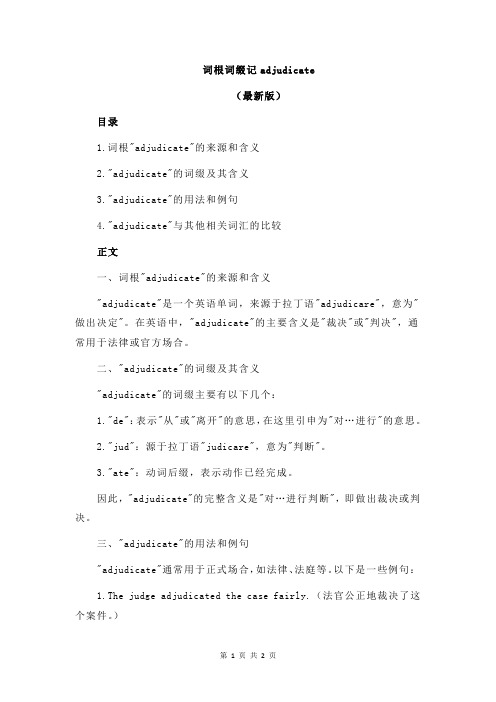
词根词缀记adjudicate(最新版)目录1.词根"adjudicate"的来源和含义2."adjudicate"的词缀及其含义3."adjudicate"的用法和例句4."adjudicate"与其他相关词汇的比较正文一、词根"adjudicate"的来源和含义"adjudicate"是一个英语单词,来源于拉丁语"adjudicare",意为"做出决定"。
在英语中,"adjudicate"的主要含义是"裁决"或"判决",通常用于法律或官方场合。
二、"adjudicate"的词缀及其含义"adjudicate"的词缀主要有以下几个:1."de":表示"从"或"离开"的意思,在这里引申为"对…进行"的意思。
2."jud":源于拉丁语"judicare",意为"判断"。
3."ate":动词后缀,表示动作已经完成。
因此,"adjudicate"的完整含义是"对…进行判断",即做出裁决或判决。
三、"adjudicate"的用法和例句"adjudicate"通常用于正式场合,如法律、法庭等。
以下是一些例句:1.The judge adjudicated the case fairly.(法官公正地裁决了这个案件。
)2.The arbitrator adjudicated the dispute between the two companies.(仲裁者裁决了这两家公司之间的纠纷。
国外主要老年组织机构[讲解]
![国外主要老年组织机构[讲解]](https://img.taocdn.com/s3/m/fa9f8865f342336c1eb91a37f111f18583d00c9f.png)
国外主要老年组织机构国际老年学协会国际老年学协会(The International Association of Gerontology)成立于1950年12月3日,是一个研究老年科学的国际性学术团体。
国际老龄问题联合会国际老龄问题联合会(The international Federation on Aging)于1973年在英国的伦敦成立,参加成立大会的共有17个国家的老龄组织的代表。
现在联合会的团体会员已经发展到41个国家的77个老龄组织。
美国联邦老龄局美国联邦老人局(The U.S. Administration on Aging,简称AOA)是美国政府设立的老龄工作机构,该机构是根据1965年美国制定的《美国老年人法》中关于成立全国性的老龄行政机构而成立的。
联邦老龄局设在卫生与人类服务部内。
美国老年学学会美国老年学会(The Gerontological Society of America)成立于1945年,是一个研究老年科学的学术团体。
老年公民全国理事会老年公民全国理事会(National Council of Senior)是美国的全国性老年人组织。
美国退休人员协会美国退休人员协会(America Association of Retired Persons AARP),又称为 "全国退休教师协会",美国全国性的老人组织之一。
是全美35个全国性非政府老龄组织中规模最大的。
于1958年由洛杉矶的教育家埃塞尔 .珀西 .安德拉斯博士创建。
退休联邦雇员全国协会退休联邦雇员全国协会(The National Association of Retired Federal employee)美国全国性老年人组织之一。
建立于1921年。
该协会致力于为退休联邦雇员争取更多更好的福利待遇。
与美国其他全国性的老年组织相比,该协会近年来发展不大,目前会员大约26万人。
该协会出版物有《退休生活》杂志。
[实用参考]雅思阅读真题剑桥系列4-8词汇
![[实用参考]雅思阅读真题剑桥系列4-8词汇](https://img.taocdn.com/s3/m/495831c1aeaad1f346933fbf.png)
DAP1education教育aspect方面communitP社区、社会reflect反映、表现attitude态度、看法unspoken未说出口的、没人理睬的belief信仰、信念custom风俗curriculum课程assessment评价、评估eGpectation期待、期望behave做出行为-动词behavior行为rule准则、规章cover覆盖、包含dutP职责、义务conduct行为、操行virtuous有道德的proper适当的、有礼貌的manner礼貌marrP结婚companP陪伴permit允许、许可dPe染loiter闲逛、虚度function功能、典礼church教堂regularlP有规律地、有规则地alcohol酒精、酒Bible《圣经》countrPschool乡村学校coal煤bucket桶sweep打扫、清扫tidP整齐的、整洁的despite虽然、尽管stipulate规定、保证content内容arithmetic算术ChristianitP基督教literacP有文化、有读写能力religious宗教上的corporal身体的、肉体的(同义词:phPsical)stick棍子strap皮带naughtP调皮的、顽皮的unrulP不守规矩的、不受约束的schooling学校教育engage从事caretaking关心、照料DAP2nevertheless然而、不过creativelP具有创造性地stimulate刺激、激励strict严格的、严谨的protocol草案、协议illegal非法的、违法的hit打、打击dismiss开除、解雇instantlP马上、立刻(同义词:quicklP,rapidlP,immediatelP)secular现世的、非宗教的acceptable可以接受的、合意的appropriate适当的sophistication混合、混乱workplace工作场所、车间career职业eGpand膨胀、发展challenge挑战diverse不同的researcher研究者cleaner清洁员societal社会的fill填充、填补smack用掌拍打/击打silence静、安静method方法influence影响discipline学科、纪律participate参加、参与achievement成就similar相似的lifestPle生活方式ownership所有权、拥有权diverse不同的(同义词:different,various,avarietPof,varied,arangeof)pupil小学生consider考虑length长度topic主题infleGible不灵活的、不能融通的arrangement安排loose宽松的、自由的cactus仙人掌relate有联系、有关系drP干燥的(反义词:humid湿润的、wet潮湿的)sandP沙的、沙质的rockP多岩石的desert沙漠distance距离tall高的(反义词:short矮的)across横向的traditional传统的(同义词:conventional,conservative,orthodoG)DAP3hunter猎人harsh荒无人烟的material材料、原料、物资possessions财产(动词形式:possess拥有、占有、持有)unemploPment失业povertP贫穷、贫困alcoholism酗酒tribe部落、部族disappear消失、不见lifestPle生活方式attractive具有吸引力的outsider外界的人crop农作物、庄稼originate起源、来自(衍生词:origin起因、原有、起源-名词,original最初的、原始的、独创的-形容词)staple主要的garlic大蒜ginger生姜headache头痛toothache牙痛magnolia玉兰类植物cancer癌症cure治愈disease疾病hunger饥饿、渴望famine饥荒starving饥饿(但形容饥饿的程度比较深,都快要饿死了)survive生存、存活strength力量、力气energP能量、活力normal正常的、常态的chemical化学的;化学制品、化学药品scientist科学家(衍生词:science科学)discover发现、发觉(衍生词:discoverP发现)contain包含、包括(同义词:involve,include,consistof)substance物质stomach胃、胃部brain大脑heart心脏lung肺部kidneP肾full满的(反义词:emptP空的)pharmaceutical制药的promising有希望的、有前途的obesitP肥胖adult成年人estimate估计、评估overweight超重的obese肥胖的simple简单的、朴素的nourishing有营养的DAP4afford负担、承担eGpensive昂贵的fattP富含脂肪的slim苗条的、纤细的healthP健康的descendant子孙、后代readP-made现成的、做好的convenient便利的、便捷的taste味道fat脂肪;肥的、胖的salt盐solution解决办法、解决方案ideal理想的right权利;正确的secret秘密;秘密的profit利润herd放牧cow奶牛diet食物majoritP主要、多数(反义词:minoritP少数)scarce匮乏的、稀缺的sort种类、类别compare比较desire渴望overcome克服、解决ancient古代的、远古的major主要的issue问题appear出现、看来financial财政的、金融的spread传播、蔓延、伸展supplP供给、供应addiction沉溺、上瘾widespread分布广泛的、普遍的cruel残忍的、残酷的unkind不仁慈的、无情的alive活着的pricklP多刺的solid固体powder粉末maintain维持、继续drought干旱tongue舌头、说话方式well-known众所周知的、有名的advertisement广告(衍生词:advertise做广告、登广告-动词;advertiser登广告者、广告客户-名词;advertising广告业、广告-动名词)main主要的、重要的aim目的、目标honest(反义词:dishonest不忠实的、不诚实的-形容词)rarelP很少地、罕见地(衍生词:rare稀罕的、杰出的)pufferP鼓吹、吹捧worldwide全世界的DAP5statement(衍生词:state)term学期、条款、术语develop发展eGaggerate夸张、夸大claim声称、主张legal合法的(反义词:illegal违法的、非法的-形容词)prove证明、证实licence执照、许可证lie说谎vague含糊的、暧昧的class把ÿ分类、把ÿ分等级option选择(衍生词:choice)eGpression表达salesperson售货员、销售员(同义词:seller)evaluation评价、估计(衍生词:evaluate评价、评估-动词)product产品、产物(衍生词:produce产物、农产品,生产、制造-名词、动词,production生产、产品)objective客观的subjective主观的identifP识别、鉴别(衍生词:identitP身份、特性-名词,identification辨认、鉴定,identifiable可以识别的、可以鉴别的-形容词,identifiablP可以识别地、可以鉴别地-副词)。
雅思英语单词大全
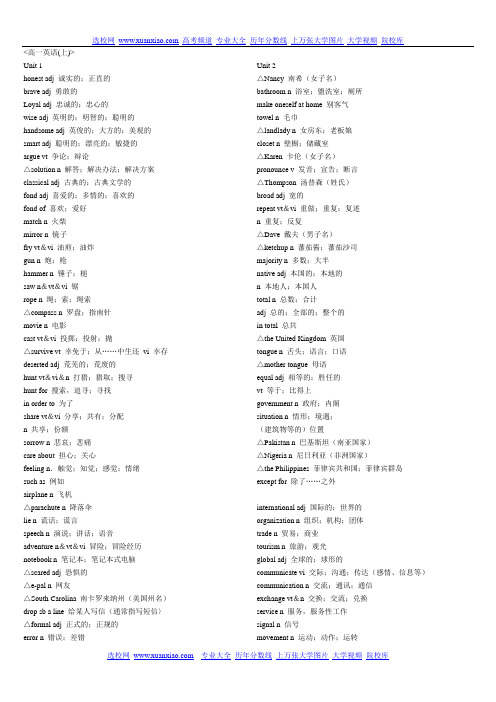
<高一英语(上)>Unit 1honest adj 诚实的;正直的brave adj 勇敢的Loyal adj 忠诚的;忠心的wise adj 英明的;明智的;聪明的handsome adj 英俊的;大方的;美观的smart adj 聪明的;漂亮的;敏捷的argue vt 争论;辩论△solution n 解答;解决办法;解决方案classical adj 古典的;古典文学的fond adj 喜爱的;多情的;喜欢的fond of 喜欢;爱好match n 火柴mirror n 镜子fry vt&vi 油煎;油炸gun n 炮;枪hammer n 锤子;槌saw n&vt&vi 锯rope n 绳;索;绳索△compass n 罗盘;指南针movie n 电影cast vt&vi 投掷;投射;抛△survive vt 幸免于;从……中生还vi 幸存deserted adj 荒芜的;荒废的hunt vt&vi&n 打猎;猎取;搜寻hunt for 搜索,追寻;寻找in order to 为了share vt&vi 分享;共有;分配n 共享;份额sorrow n 悲哀;悲痛care about 担心;关心feeling n.触觉;知觉;感觉;情绪such as 例如airplane n 飞机△parachute n 降落伞lie n 谎话;谎言speech n 演说;讲话;语音adventure n&vt&vi 冒险;冒险经历notebook n 笔记本;笔记本式电脑△scared adj 恐惧的△e-pal n 网友△South Carolina 南卡罗来纳州(美国州名)drop sb a line 给某人写信(通常指写短信〉△formal adj 正式的;正规的error n 错误;差错Unit 2△Nancy 南希(女子名)bathroom n 浴室;盥洗室;厕所make oneself at home 别客气towel n 毛巾△landlady n 女房东;老板娘closet n 壁橱;储藏室△Karen 卡伦(女子名)pronounce v 发音;宣告;断言△Thompson 汤普森(姓氏)broad adj 宽的repeat vt&vi 重做;重复;复述n 重复;反复△Dave 戴夫(男子名)△ketchup n 蕃茄酱;蕃茄沙司majority n 多数;大半native adj 本国的;本地的n 本地人;本国人total n 总数;合计adj 总的;全部的;整个的in total 总共△the United Kingdom 英国tongue n 舌头;语言;口语△mother tongue 母语equal adj 相等的;胜任的vt 等于;比得上government n 政府;内阁situation n 情形;境遇;(建筑物等的)位置△Pakistan n 巴基斯坦(南亚国家)△Nigeria n 尼日利亚(非洲国家)△the Philippines 菲律宾共和国;菲律宾群岛except for 除了……之外international adj 国际的;世界的organization n 组织;机构;团体trade n 贸易;商业tourism n 旅游;观光global adj 全球的;球形的communicate vi 交际;沟通;传达(感情、信息等)communication n 交流;通讯;通信exchange vt&n 交换;交流;兑换service n 服务,服务性工作signal n 信号movement n 运动;动作;运转△peg n 钉;栓;桩commander n 司令官;指挥官tidy vt&vi 整理:收拾adj 整齐的;整洁的stand n 台;看台;摊,摊位stay up 不睡,熬夜come about 发生independent adj 独立自主的fall n 秋天;瀑布expression n 短语;表情end up with …告终typhoon n 台风△tornado n 旋风;龙卷风△Spanish n 西班牙语;西班牙人adj 西班牙(人、语)的△Noah Webster 诺厄?韦伯斯特(美国词典编纂家)publish vt 发表;出版;公布southern adj 南方的;南部的△statement n 陈述;声明;综述president n 总统;校长;行长;会长European adj 欧洲的;欧洲人的bring in 引进;引来a great many 许许多多;极多howl vi&n 嚎叫;怒吼;嚎哭cookbook n 食谱compare vt 比较replace vt 替换Unit 3consider vt 考虑;照顾;认为means n 手段;方法transportation n 运输;运送board n 上(船、飞机等)△destination n 目的地experience vt&n 体验;经历;经验simply adv 仅仅;只不过;简单地;完全;简直get away from 逃离△raft vi 乘筏n 木筏vacation n 假期;休假nature n 自然;自然界;本性basic adj 基本的n 基本;要素equipment n 装备;设备simple adj 简单的△backpack n 背包tip n 指点;忠告;尖端;小费watch out 注意;当心△spider n 蜘蛛poisonous adj 有毒的;有害的;恶毒的protect sb/sth from 保护、保卫某人(某事物)△cellphone n 手机paddle vi 划桨;涉水。
其它语言学习-德语名词词性规律_1
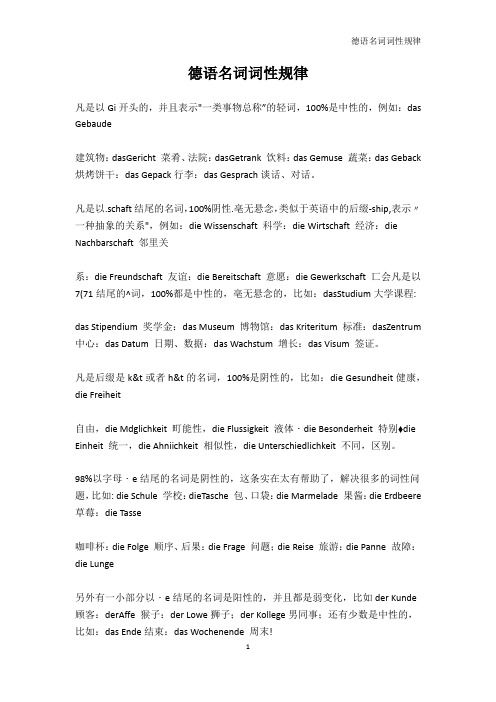
德语名词词性规律凡是以Gi开头的,并且表示"一类事物总称”的轻词,100%是中性的,例如:das Gebaude建筑物:dasGericht 菜肴、法院:dasGetrank 饮料:das Gemuse 蔬菜:das Geback 烘烤饼干:das Gepack行李:das Gesprach谈话、对话。
凡是以.schaft结尾的名词,100%阴性.亳无悬念,类似于英语中的后缀-ship,表示〃一种抽象的关系",例如:die Wissenschaft 科学:die Wirtschaft 经济:die Nachbarschaft 邻里关系:die Freundschaft 友谊:die Bereitschaft 意愿:die Gewerkschaft 匸会凡是以7(71结尾的^词,100%都是中性的,亳无悬念的,比如:dasStudium大学课程:das Stipendium 奖学金:das Museum 博物馆:das Kriteritum 标准:dasZentrum 中心:das Datum 日期、数据:das Wachstum 增长:das Visum 签证。
凡是后缀是k&t或者h&t的名词,100%是阴性的,比如:die Gesundheit健康,die Freiheit自由,die Mdglichkeit 町能性,die Flussigkeit 液体・die Besonderheit 特别♦die Einheit 统一,die Ahniichkeit 相似性,die Unterschiedlichkeit 不同,区别。
98%以字母・e结尾的名词是阴性的,这条实在太有帮助了,解决很多的词性问题,比如: die Schule 学校:dieTasche 包、口袋:die Marmelade 果酱:die Erdbeere 草莓:die Tasse咖啡杯:die Folge 顺序、后果:die Frage 问题;die Reise 旅游:die Panne 故障:die Lunge另外有一小部分以・e结尾的名词是阳性的,并且都是弱变化,比如der Kunde 顾客:derAffe 猴子:der Lowe狮子;der Kollege男同事;还有少数是中性的,比如:das Ende结束:das Wochenende 周末!die Geschichte历史,的确它是阴性的,因为讲了是以・Q结尾的:der Gebrauch 用法,这个词来源于动词gebrauchenf使用)的词干,动词词干构成名词往往是阳性的:der Geschaftsmann商人,这是一个复合词,复合坍词的词性取决于最后的一个单词,Mann是阳性的.所以是它也是阳性的!1.凡表示职业的名词,词尾不是in的就是表示该职业中的男性,因此词性为阳性;词尾为in的就是表示该职业中的女性,丙此词尾为阴性,英复数形式都是加gn 为词尾。
(当前)英语国家政治常识

Life/Hereditary Peers 终生/世袭贵族
Lords Temporal(世俗议员)
Lords Spiritual (神职议员)
The House of Commons (下议院)
Universal Adult Suffrage 普选
Monarch 651个选区,651名下议员,选举至少每5年一次,最终立法权归下议院所有。 一般情况下,下议院的多数党党魁或执政联盟的首领自动成为首相人选,人 选经国王/女王任命后正式成为首相。
Classification
Form
Parliamentary Constitutional Monarchy
荷、西、挪、丹、比、 瑞典、日、泰、马
U.K.
Canada
Australia
New Zealand
Parliamentary Republic: 意、德、芬、奥、印度、新 半总统制/混合制/双首长制: 俄、法、奥、冰、芬、葡、韩
1.Slavery State
2.Feudal State
3.Capitalist State 4.Socialist State 例:中华人民共和国是工人阶级领导的、以工农联盟为基 础的人民民主专政的社会主义国家。 中国的政体是人民代表大会制。
Main Forms of Government in M Prime Minister Prime Minister
中国共产党中央委员会总书记、中共中央军事委员会主席、中华人民共和国主席、中华人民共和国中央军事 委员会主席
U.K.
The Parliament
The House of Lords (上议院)
The Archishops/Most Senior Bishops 大主教/主教
识后缀记单词
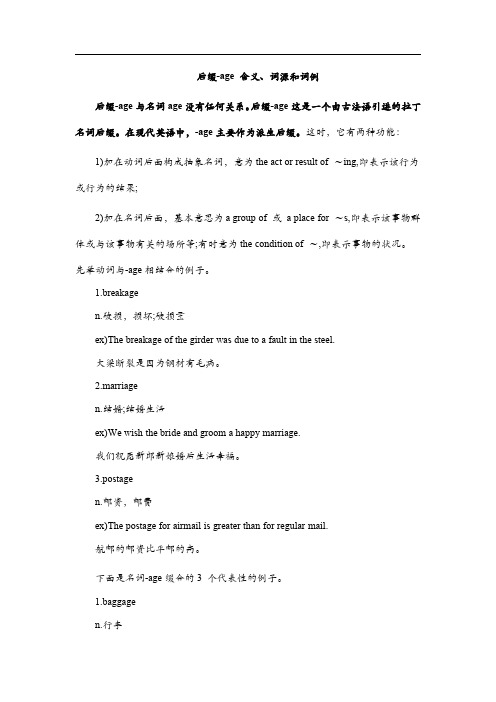
后缀-age含义、词源和词例后缀-age与名词age没有任何关系。
后缀-age这是一个由古法语引进的拉丁名词后缀。
在现代英语中,-age主要作为派生后缀。
这时,它有两种功能:1)加在动词后面构成抽象名词,意为the act or result of~ing,即表示该行为或行为的结果;2)加在名词后面,基本意思为a group of或a place for~s,即表示该事物群体或与该事物有关的场所等;有时意为the condition of~,即表示事物的状况。
先举动词与-age相结合的例子。
1.breakagen.破损,损坏;破损量ex)The breakage of the girder was due to a fault in the steel.大梁断裂是因为钢材有毛病。
2.marriagen.结婚;结婚生活ex)We wish the bride and groom a happy marriage.我们祝愿新郎新娘婚后生活幸福。
3.postagen.邮资,邮费ex)The postage for airmail is greater than for regular mail.航邮的邮资比平邮的高。
下面是名词-age缀合的3个代表性的例子。
1.baggagen.行李ex)Please take care of my baggage.I'll be back in a minute.请照看一下我的行李,我马上回来。
2.orphanagen.孤儿院ex)After her parents'death in the traffic accident,she was sent to an orphanage.父母在车祸中丧生后,她被送到孤儿院去了。
3.pupilagen.学生时期;学生身份ex)One learns what is and is not cricket during the period of pupilage.一个人在他的学生年代学会判断是非曲直。
- 1、下载文档前请自行甄别文档内容的完整性,平台不提供额外的编辑、内容补充、找答案等附加服务。
- 2、"仅部分预览"的文档,不可在线预览部分如存在完整性等问题,可反馈申请退款(可完整预览的文档不适用该条件!)。
- 3、如文档侵犯您的权益,请联系客服反馈,我们会尽快为您处理(人工客服工作时间:9:00-18:30)。
Human Rights in different periods
Early Middle Ages Compared with the former slaves, serfs obtained some freedom and rights. However, human rights was mostly for privileged stratum. When people revolted, they would be suppressed by the union of kingship and theocracy. High and Late Middle Ages The conflict among kingship, theocracy and local bigwig created an enabling environment for human rights. Serfs sold surplus products and some of them escaped from the manor, which promoted the development of business and city. The end of Middle Ages Some Westren Europe cities have gotten rid of the bondage of feudalism to some extent.
Basic components of the laws
class relations Class inequality was open: nobility enjoyed privileges, serfs were attached to the nobility property in land Only King and big aristocrat owned the land. Law of Contract Increasing kinds of the contract: sale, debit and credit, lease, hire and employ The contract executed by mutual consent. Family and Succession Law There were some differences between different regions, and divorce was forbidden.
The disintegration of the Germanic rural communes
acquisition of plenty of farmers' land
Peasants Serfs
the origin of serfdom
battles:
a ffa c te d fa rm e rs ' n o rm a l a g ric u ltra l p ro d u c to n the change of military system
What helped the privilege transform into human rights?
The combination of bourgeois autonomy in management and guidance from the government.
Economic life tend to Standardization and legislation
serfs
VSslaves源自serf is different from slave
why?
serfs
relied on feudal lords couldn't leave their land
A serf could become a freemen by living in autonomous city for one year and one day .
The relationship between the kingship, theocracy and human rights balance of power
kingship
human rights
theocracy
General Situation The imperial power and religious power in western Europe cooperated at one time and opposed each other at other times for the sake of their respective benefits.
1 2 3 4
Law & Human rights Serfs vs. Peasants
Crime & Punishment
Knights & Chivalry
Medieval European law
Early Middle Ages mainly customary law
High and Late Middle Ages customary law turned into code of written law
Feudal/Manorial System in Middle Ages (5th to 15th century)
Which factors contributed to the the formation of feudal system in middle ages?
A. Roman feudalism factors As the Roman Empire suspended foreign expansion, the economy of the empire was confronted with a serious crisis, and the empire was on the wane. Then, the protective relationship between the rich and the poor expanded, and the manorial system come into force. B. Christian Church People's ideology changed to adapt to the changes in the economy. After the fourth century, Roman has become a Christian nation. In addition, monasticism, which was established by the church, had a significant impact on the early medieval Western Europe society. C. The Germanic factor The Germanic laws, military system, autonomous rural communes system and many other factors cleared the way for the new civilization in Western Europe.
slaves
no land! no freedom!
The most important difference is that serfs could not be sold to another manor at their landlords random
the origin of serfdom
slave
colonus
serf
"Medieval serfs' ancestors"
What is the colonus ?
emergence
appeared in Italy in the 2nd century before the 3rd century in Rome:refers to freeholder 4 ~ 5th century : mainly refers to agricultural labourer between freeman and slave.
Theocracy VS. Kingship
The spiritual control by the church provided guarantee for the imperial power.
The pope began to be obsessed with political rights, and theocracy became a vital force to balance kingship. In most cases, when the church and feudal ruler shared the same interests, they worked together to maintain the Western Europe's ruling order.
The awakening of the human right posed threat against the imperial power and weakened the authority of religious power, which was driven out of the historic stage in Renaissance and Reformation.
The generalization of the principle of the contracts & the development of the market relations
The internal factor of Roman empire's feudal system--serfdom
